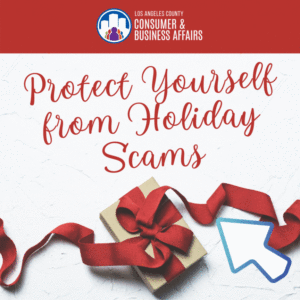The holiday season is an exciting time for many families. Don’t let scams, theft, and fraud ruin your joy. Before you make a purchase or donation, be prepared to identify questionable activity to avoid becoming a victim. Don’t let these common scams ruin your holidays:

Spam Phone Calls and Text Messages – From robocalls to text messages, scammers are able to contact you around the clock. Some common scams are:
- Fake package delivery notification and updates: Scammers will try to convince a recipient that they need to share personal information to “confirm” a purchase or pay more for delivery of a package.
- IRS tax scams: Scammers try to trick victims by claiming they are the IRS and can take payment with gift cards or wire transfers. Learn more about the IRS phone scam, and how to protect yourself here.
- Fraudulent lotteries, sweepstakes, and giveaways: Scammers ask for payment and personal information for a “FREE” prize that you never signed up for. They often ask you to pay by wire transfer or with a gift card. These are red flags for scam.
All phone and text scams are targeting your money and your personal information. Delete suspicious texts and ignore calls from unknown phone numbers.
While avoiding all scam calls and texts is unlikely, you can take steps to limit them:
- Use your phone’s built-in features: You can block calls from specific numbers or set up a Do Not Disturb feature, which allows you to set the hours that calls will go straight to voicemail.
- Consider a call-blocking app: Some apps charge for their services, but they can allow you to stop some calls, let some calls ring silently or go straight to voicemail, or block calls from a certain geographic locations or area codes.
Phishing Emails – Scammers use emails that look like they come from actual retailers. Never click on a link or open an attachment from suspicious emails or send over any payment. Phishing emails are designed to steal your personal information. Shop through safe, reputable, and encrypted websites. Use a store’s official app if using a mobile device and make sure your anti-virus software is current.
Porch Pirates – Lots of online shopping means lots of packages being delivered. Scammers prowl neighborhoods to steal deliveries. Make sure to bring all packages indoor promptly or get them shipped to your office or another safe address, if possible. Also be sure to stop your mail if you’re going out of town, as scammers can go through and find your personal information to steal your identity. Learn more about mail fraud and scams here.
Gift Card Scams – Before you purchase a gift card, make sure it hasn’t been tampered with and don’t share the number with anyone. Scammers will often write down the numbers and PIN activation codes of several cards so they can steal the money once activated by unsuspecting victims. Encourage the gift card recipient to keep their card safe, track purchases using the secure gift card’s website or calling the customer service number. Or consider giving your recipient the gift that works just about anywhere: cash.
Popular Toys and Gifts Sold from a Suspicious Outlet – Scammers will list the most hard-to-find items this holiday season on social media platforms, online classified websites, and even create fake online stores with no intention to ever deliver the products because they don’t have them. Make sure you research the seller, shop around at reputable businesses, and pay by credit card so you can dispute the charge later if needed. Learn more here.
Donation Scams – The holidays are a great opportunity to donate money to non-profit organizations and charities. Before you donate, verify that the organization is reputable and always ask for a receipt for your records. Learn more about donating safely here.
Purchase Add-ons – Think twice, sign once. Read and understand contracts thoroughly before signing them. Think over warranties and see if it is really worth the extra cost before signing up. Don’t feel pressured by sales associates and deals. Shop with a plan and walk away to think about it if you’re unsure. If you need to cancel a contract, read our article here to find out if your purchase is eligible.
Utility Scams – Electric, water, or gas service scams continue to victimize neighborhoods. Watch out for fraudsters posing as local utility company workers, threatening to cut off your services. Some are even taking advantage of people who need help paying these bills, asking for half of the money owed in order to forgive the rest. Learn more on avoiding this scam here.
Be a vigilant and careful consumer to keep your hard-earned money and make sure your loved ones, not scammers, receive the gifts you intended for them. If you have any questions, concerns, or would like to report suspected fraud in Los Angeles County, please contact the Department of Consumer and Business Affairs online at dcba.lacounty.gov or via telephone at 800-593-8222.

